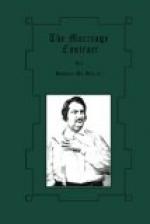“Madame,” he replied, aloud, “will keep the hundred and fifty thousand francs remaining from the sale of the house. This sum, added to the value of her furniture, can be invested in an annuity which will give her twenty thousand francs a year. Monsieur le comte can arrange to provide a residence for her under his roof. Lanstrac is a large house. You have also a house in Paris,” he went on, addressing himself to Paul. “Madame can, therefore, live with you wherever you are. A widow with twenty thousand francs a year, and no household to maintain, is richer than madame was when she possessed her whole fortune. Madame Evangelista has only this one daughter; Monsieur le comte is without relations; it will be many years before your heirs attain their majority; no conflict of interests is, therefore, to be feared. A mother-in-law and a son-in-law placed in such relations will form a household of united interests. Madame Evangelista can make up for the remaining deficit by paying a certain sum for her support from her annuity, which will ease your way. We know that madame is too generous and too large-minded to be willing to be a burden on her children. In this way you can make one household, united and happy, and be able to spend, in your own right, one hundred thousand francs a year. Is not that sum sufficient, Monsieur le comte, to enjoy, in all countries, the luxuries of life, and to satisfy all your wants and caprices? Believe me, a young couple often feel the need of a third member of the household; and, I ask you, what third member could be so desirable as a good mother?”
“A little paradise!” exclaimed the old notary.
Shocked to see his client’s joy at this proposal, Mathias sat down on an ottoman, his head in his hands, plunged in reflections that were evidently painful. He knew well the involved phraseology in which notaries and lawyers wrap up, intentionally, malicious schemes, and he was not the man to be taken in by it. He now began, furtively, to watch his brother notary and Madame Evangelista as they conversed with Paul, endeavoring to detect some clew to the deep-laid plot which was beginning to appear upon the surface.
“Monsieur,” said Paul to Solonet, “I thank you for the pains you take to conciliate our interests. This arrangement will solve all difficulties far more happily than I expected—if,” he added, turning to Madame Evangelista, “it is agreeable to you, madame; for I could not desire anything that did not equally please you.”
“I?” she said; “all that makes the happiness of my children is joy to me. Do not consider me in any way.”
“That would not be right,” said Paul, eagerly. “If your future is not honorably provided for, Natalie and I would suffer more than you would suffer for yourself.”
“Don’t be uneasy, Monsieur le comte,” interposed Solonet.
“Ah!” thought old Mathias, “they’ll make him kiss the rod before they scourge him.”




